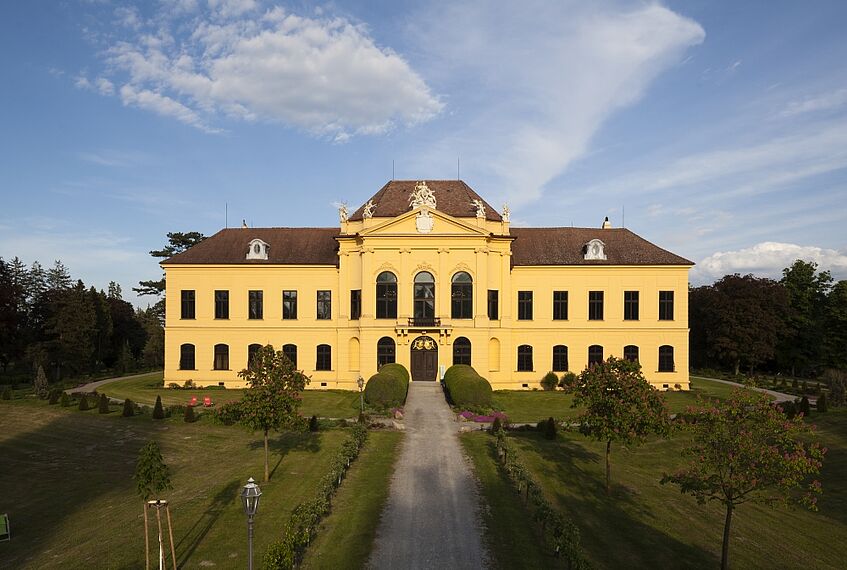1918-1938-2018: Dawn of an Authoritarian Century?
International Conference (5-7 September 2018)
Please find a complete documentation of the conference on the homepage of the Federal Agency for civid Education, Bonn: www.bpb.de
The year 2018 sees the commemoration of several important historical events in Austria and Germany that continue to have an influence on our society. The Federal Agency for Civic Education, Bonn and the Department of Contemporary History of the University of Vienna will hold a conference that focuses on the events of 1918 and 1938 as well as their extensive effects and possible influence on the course of future events. The location of the conference is also a part of this history; Schloss Eckartsau was once a hunting lodge of the Habsburg family and where Emperor Karl signed the declaration relinquishing his claim to the Hungarian part of the empire on 13 November 1918.
2018 sees the anniversary of three significant events in European history with varying levels of commemorative intensity:
November 1918 – the end of the First World War and the short-lived blossoming of parliamentary democracy that followed the fall of various monarchies but quickly transformed in many cases into authoritarian or totalitarian regimes.
March and September 1938 – the two military and geopolitical conditions of Hitler’s aggressive expansion policies that would lead to the violence of the Second World War were created amid international compliance: the “Anschluss” of Austria, already eroded by Austro-fascism, and the dissolution of democratic Czechoslovakia through the Munich Agreement.
November 1938 – the targeted destruction of synagogues and the imprisonment of Jews in the National Socialist German Reich, including racially motivated murder. The events represented a radical next step on the path to the Shoah, the persecution and genocide of the European Jews.
In 1997, Ralf Dahrendorf foresaw developments that are currently occurring in Europe and internationally that have fundamentally questioned parliamentary democracy as the “politics of freedom” (Dahrendorf), identifying them as a social outcome of globalisation. The digital revolution has had a greater effect than the sociologist Dahrendorf could predict; living and work conditions have been radically changed and overturned with dramatic consequences for all traditional lifestyles and societal cohesion. The longing for a new “strong leader” continues to grow.
The aforementioned historical events will be critically examined within this context. The varying perspectives on history reflect the intensity of a parliamentary democracy and the political enlightenment. Empirical studies have shown that active political engagement to strengthen democratic decisions and processes is more pronounced when a nation is able to examine their own “national” history more critically. Whereas authoritarian conditions and less critical examinations of the respective national perceptions of history make the extreme emotional instrumentalisation of history for ideological or party-political purposes much easier.
Conference Committee
- Linda Erker (Department of Contemporary History, Vienna)
- Hans-Georg Golz (Federal Agency for Civic Education, Bonn)
- Johann Kirchknopf (Department of Economic and Social History, Vienna)
- Johannes Piepenbrink (Federal Agency for Civic Education, Bonn)
- Oliver Rathkolb (Department of Contemporary History, Vienna)
Organizers
- Federal Agency for Civic Education, Bonn (Bundeszentrale für politische Bildung, Bonn)
- University of Vienna, Department of Contemporary History (Universität Wien, Institut für Zeitgeschichte)
Partners
- Austrian Cultural Forum Bratislava (Rakúske Kultúrne Fórum Bratislava)
- Austrian Embassy Bratislava (Österreichische Botschaft Pressburg)
- Austrian Federal Forests (Österreichische Bundesforste AG)
- Institute for German Culture and History of South-eastern Europe at the Ludwig-Maximilian University, Munich; supported by the Federal Government Commissioner for Culture and Media (Institut für deutsche Kultur und Geschichte Südosteuropas an der Ludwig-Maximilians-Universität München; gefördert von der Beauftragten der Bundesregierung für Kultur und Medien)
- Institute for Human Sciences IWM, Vienna (Institut für die Wissenschaften vom Menschen, Wien)
- Leo Baeck Institute - New York|Berlin (LBI New York|Berlin)
Supported by
- Advisory Council for the Commemorative Year 2018 (Beirat für das Gedenk- und Erinnerungsjahr 2018 )
